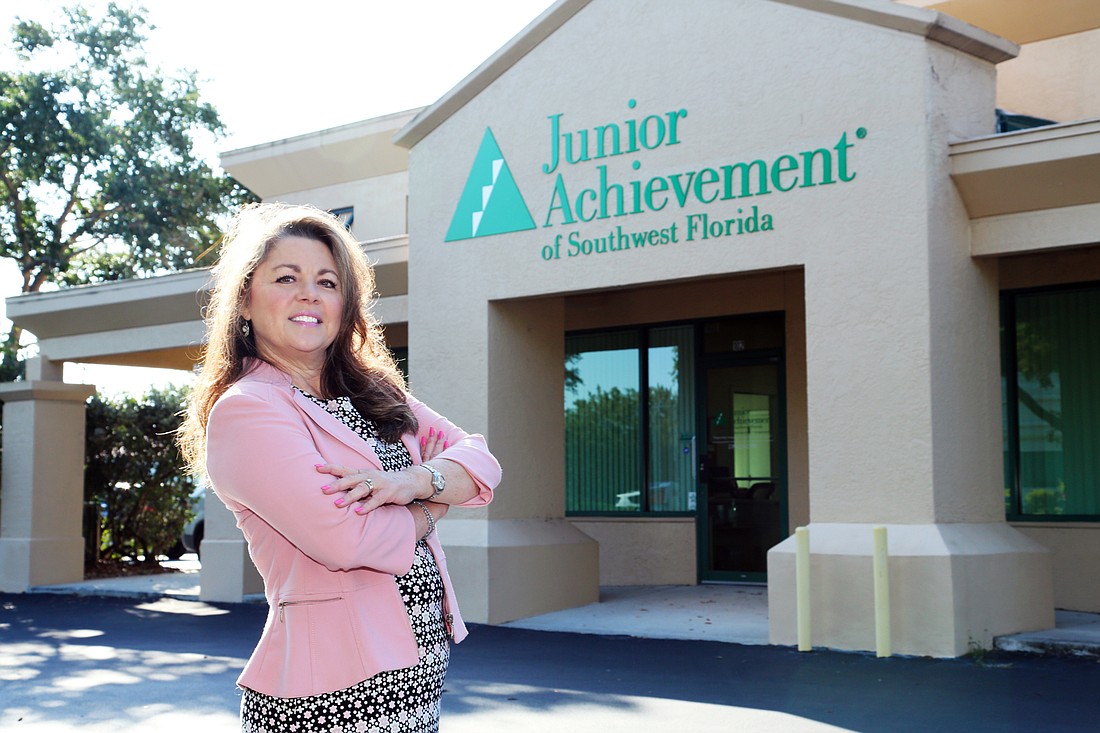- December 25, 2024
-
-
Loading

Loading

For an organization with a prime mission carried out by volunteers who deliver in-person sessions — in schools, no less — the pandemic presented specific challenges for Junior Achievement of Southwest Florida
But like the many of the executives and businesspeople who volunteer for the nonprofit in the classrooms, the organization didn’t sit idle as pandemic-driven school closures crushed its model. Even schools that were opening significantly limited non-essential personnel from entering the building.
In response to the challenges, Angela Fisher, president and CEO of Junior Achievement of Southwest Florida, decided to practice what JA preaches.
'We went very quickly instead of just waiting around for things to happen.’ Angela Fisher, Junior Achievement of Southwest Florida
“We went very quickly instead of just waiting around for things to happen,” says Fisher, 57. “We took the approach of accelerating and not looking at what we can’t do but what can we do. We needed to be creative and use critical thinking, just like we teach our students to do.”
During the 2019-2020 school year, Junior Achievement of Southwest Florida provided almost 70,000 hours of instruction to nearly 10,500 students in Collier, Lee and Charlotte counties. Instruction typically takes place in the classroom or at after-school programs. But when the pandemic hit and schools shut down, the organization immediately sprang into action to make sure students didn’t miss out.
“Junior Achievement is really about education development, youth development and economic development,” Fisher says. “We really feel that our purpose is filling that gap in youth development, specifically around career readiness and planning and money education. Because it really directly impacts our students’ futures.”
The organization first started by ensuring that its program materials and activities focused on topics like financial literacy and career preparation were available online for teachers and parents to use. “It was to keep students engaged and busy and learning,” says Fisher.
Then it turned its focus to the 2020-2021 school year. Fisher operated under a plan-for-the-worst mentality.
“What I said early on when we had our staff meetings was we’re going to prepare for not going back to school [for the 2020-2021 school year],” she says. “We’re going to prepare for the worst-case scenario of all virtual. We already know we can do in person, so let’s put all of our efforts into going virtual and being there to support our community and being that solution provider and option for students, parents and teachers.”
JA of Southwest Florida created two new delivery models for its classroom instruction. One could be led by educators working either in the classroom or virtually with their students. A virtual Junior Achievement volunteer would join in on those lessons either live or via a prerecorded clip. For the other delivery model, live volunteers would visit classrooms virtually to lead the lesson.
“In some ways it was a big lift, but in other ways it wasn’t,” says Fisher. The organization itself already had a firm grasp on technology like Zoom, but some volunteers needed training.
In addition to creating methods for online instruction, JA of Southwest Florida also transitioned events, like the career exploration fair that’s part of its JA Inspire program, to a virtual format. Collier County eighth graders got the chance to explore virtual career booths and hear from speakers in industry sectors like technology, business and finance and health and life sciences in March. Lee County students will have the same opportunity in June.
While the organization looks forward to being able to resume face-to-face contact with the students it serves, the pandemic shifts it was forced to make did have some unexpected upsides.
“We actually got more folks to volunteer, because it was easier since they didn’t have the drive time,” says Fisher. “They could just jump on Zoom and connect. So it definitely has its pros from that aspect….We fully intend to go back to in-person mentoring with our students, but we are going to keep a great amount of flexibility with being able to do some virtual programming as well.”
The organization also realized that it didn’t need to pay to print certain workbooks and materials, as making them available online worked just as well. And it’s actually been able to increase the number of students it works with this year — growing that number to around 16,000.
Fisher’s already begun looking ahead to the 2021-2022 school year, which she hopes will be a return to more normal operations with some virtual offerings sprinkled into the mix. “We’re looking forward to that interaction in classrooms,” she says. “But it will be great to have that flexibility to also get some folks to be mentors and be involved with students that we couldn’t get before because of timing. We’re planning for in-person next year. But we know if not we’ve already got that Plan B for virtual down cold.”